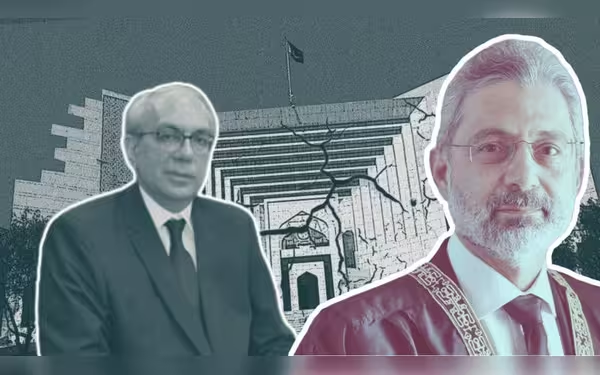Saturday, November 16, 2024 05:51 PM
Supreme Court's Article 63-A Ruling Sparks Controversy
- Supreme Court criticizes previous ruling on lawmakers' disqualification.
- Judges overstepped authority, infringing on constitutional rights.
- Importance of respecting democratic processes emphasized.
 Image Credits: thefridaytimes
Image Credits: thefridaytimesSupreme Court of Pakistan's ruling on Article 63-A raises concerns over judicial overreach and the integrity of democratic processes.
The recent ruling by the Supreme Court of Pakistan has sparked significant debate regarding the interpretation of Article 63-A of the Constitution. This article deals with the disqualification of lawmakers who vote against the directives of their parliamentary party heads. The Supreme Court's decision, delivered by Chief Justice Qazi Faez Isa, has raised questions about the authority of judges in political matters and the implications of their rulings on the democratic process in Pakistan.
On Thursday, the Supreme Court issued a detailed 23-page decision that highlighted contradictions in a previous ruling made by a three-member bench. The earlier ruling suggested that lawmakers who defy their party's directives would face automatic disqualification. However, the Supreme Court found that this interpretation was "against the clear language and mandate of the Constitution" and contradicted the decisions of larger benches within the court.
The Chief Justice's ruling emphasized that the original judges overstepped their boundaries by attempting to disqualify lawmakers without following the proper constitutional procedures. The court pointed out that the judges had taken on the role of the Election Commission, which is responsible for adjudicating matters of defection, thus infringing upon the rights granted by Article 63-A.
According to the Supreme Court, the provisions of Article 63-A are clear and do not require interpretation. The article does not state that votes should not be counted or that lawmakers would be automatically de-seated for abstaining from voting against their party's direction. The court criticized the previous judges for disregarding these clear stipulations and for nullifying the jurisdictions of both the party head and the Election Commission.
The ruling also highlighted the importance of fair trial rights and due process, stating that when a court takes jurisdiction upon itself, it undermines these fundamental rights. The Chief Justice noted that the majority's judgment seemed to replace constitutional wisdom with subjective moral judgments, which is not the role of the judiciary.
Furthermore, the Supreme Court expressed concern over the contempt shown towards parliamentarians in the previous ruling. The court reminded the public that Pakistan's independence was achieved through the efforts of politicians who adhered to constitutional principles. This historical context serves as a reminder of the importance of respecting the roles of elected officials within the framework of democracy.
The Supreme Court's recent ruling serves as a critical reminder of the delicate balance between judicial authority and political processes in Pakistan. It underscores the necessity for clear interpretations of constitutional provisions and the importance of maintaining the integrity of democratic institutions. As the nation moves forward, it is essential for all stakeholders to respect the rule of law and ensure that the rights of lawmakers and citizens alike are upheld in accordance with the Constitution.













